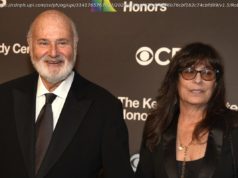The Supreme Court nominee seemed to blame the editors—one of whom was his good friend—for crude words on his yearbook page. Judge is also implicated in assault allegations against Kavanaugh.
It’s easy to blame the editors.
Last week, during a hearing before the Senate Judiciary Committee, Brett Kavanaugh suggested his classmates working on the yearbook—and not him—were responsible from the material that appeared on his page. “I think some editors and students wanted the yearbook to be some combination of Animal House, Caddy Shack and Fast Times at Ridgemont High, which were all recent movies at that time,” he told the Senate panel.
One of those editors was Mark Judge, Kavanaugh’s friend whom Christine Blasey Ford has said was in the room when Kavanaugh allegedly sexually assaulted her.
I’ve reviewed several years worth of yearbooks from Georgetown Prep, including 1983,1984, and 1986, the year Supreme Court justice Neil Gorsuch graduated from Prep. In the 1983 yearbook, Judge is listed as “caption editor.” In most cases, the yearbooks follow a similar structure. There are a series of interstitial pages with photos of the year—Winter Ball, pep rallies, campus life— followed by underclassmen photographed in small groups of five or six, organized alphabetically, and then the seniors’ pages. The seniors would submit their pages to the editors of the yearbook, including Judge, who ultimately compiled the book. The resulting product is, in many of the years I reviewed, rather juvenile, as expected, and, at times, overtly misogynistic.
Judge declined to comment for this story through his lawyer. Several other Georgetown Prep yearbook editors did not respond to interview requests.
In 1983, each senior was given a full page in the yearbook where they listed high school accomplishments, and, for some, a litany of inside jokes. Kavanaugh’s yearbook page includes lines such as “100 Kegs or Bust”, “Renate Alumnius” [sic], “Devil’s Triangle”, and “Beach Week Ralph Club.”
“Renate Alumnius” refers to Renate Schroeder Dolphin, a young woman from a nearby Catholic girls’ school, and a handful of football players at Prep’s “unsubstantiated boasting” about their sexual conquests with her, according to the New York Times. Kavanaugh has denied that interpretation of the note on his and 13 other pages in the yearbook, but a handful of classmates argued to the Times that it was, in fact, meant in a disrespectful way. And, for her part, Dolphin told the Times, “I can’t begin to comprehend what goes through the minds of 17-year-old boys who write such things, but the insinuation is horrible, hurtful and simply untrue. I pray their daughters are never treated this way.”
The uncouth and sexist tone of the yearbooks, year after year, was ubiquitous enough that it suggests more of an intentional theme than the isolated actions of a handful of yearbook editors. In 1984, the year after Kavanaugh and Judge graduated, for example, captions read things like, “some girls will do ANYTHING to go to a Prep dance!”; and “good friends always share” next to a photo of a young woman sandwiched between two Prep students with their arms around her.
The captions on the interstitial pages—things, in 1983, like, “Do these guys beat their wives,” next to a photo of Prep students—were Judge’s responsibility. But, as one Georgetown Prep alum told me, they are broadly reflective of the general senses of humor of the student body—at least the “popular” kids. He asked to remain anonymous because he didn’t want former classmates to know he shared the yearbooks with a reporter.
Kavanaugh was a part of that crew: The captain of the basketball team, a staple of parties—which were home of, as many former classmates have said, heavy drinking. Of course, there were those in the Prep community who did not take part in those activities, as the Prep alumnus I spoke with told me, however, this person says drinking was pervasive among the crowds Kavanaugh hung out in.
For its part, Georgetown Prep has tried to distance itself from the culture many 80s alumni have described and which it argues the media is covering, “in pursuit of their own agenda,” without mentioning Kavanaugh specifically. “It is demonstrably false that such behavior or culture is tolerated, still less encouraged, at Georgetown Prep,” the institution said in a statement last week. The school did not return a request for further comment.
Regardless of the school’s potential cultural flaws, however, one particularly striking back and forth during last week’s hearing, between Senator Sheldon Whitehouse and Kavanaugh, stands out:
Kavanaugh’s attempt to distance himself from his words by allowing that, perhaps, the editors could have changed what he submitted is understandable. However, to blame the editors is, in part, to blame his friend—and any legitimate attempt to distance himself from those words comes off as empty when that close relationship is taken into account.
During the Senate hearing, what began as an attempt to resolve whether or not Kavanaugh was party to a misogynistic culture that lent itself to the potential of sexual assault, morphed into a discussion about whether he would be honest about his own words and actions, or try push the responsibility onto others.






